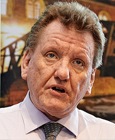

By Ian Wright.
My suspicion is that among today’s generation of corporate affairs directors there are at least half a dozen who will go on to be CEOs.
For decades the finance and sales functions have provided the majority of the talent pipeline for the CEO’s office. The list of candidates can be supplemented by specialists: for example, in businesses like Pharma, commercially savvy research scientists have widened the field and among extraction companies mining engineers – very frequently from Imperial College – have held sway. Increasingly the role of Marketing Director can be as much an audition for the lead part as an operational job. So, as an increasing number of contenders aspire to lead big business, the question arises if those who practice in the fields of communications, PR and public affairs can also do so.
Actually, the question has already been answered. Pearson CEO John Fallon is a corporate affairs professional who went on to prove himself as a commercial and corporate leader. Pearson has a practice of promoting talented leaders from wherever they originate: my former colleague, the scarily impressive Luke Swanson who left Diageo to succeed Fallon, is now on the same path having moved into a major commercial role.
There are many other role models. Simon Lewis, perhaps the most distinguished corporate affairs director of his generation with spells at Nat West Bank, Centrica and Vodafone, also undertook major commercial positions and now heads up a very commercial trade association. Similarly, Simon Walker, formerly of No 10 Downing Street and Buckingham Palace as well as BA and Reuters, now leads the Institute of Directors and Mark Ware (previously at BP) now heads a major division of oil trader Vitol.
They all share a deep understanding of the commercial dynamics of business and have the judgement and acumen to apply it in the marketplace. These qualities are increasingly required to do the job required of communications teams in big companies. In fact, it is simply not possible to tell the corporate story without having a total grasp of the numbers which underpin the business. Nor will anyone without the capacity to demonstrate that understanding under testing conditions carry the confidence of senior colleagues.
But corporate affairs practitioners bring other important and unique skills to the table, too. We communicate clearly – a must-have talent for today’s business leader. We understand the outside world – often far better than colleagues. It is our job to apply that understanding and expose business decisions to the scrutiny it can offer. That may mean facing other senior executives with unpalatable truths, so a degree of moral courage is required – again, a vital pre-requisite for any business leader.
The ability to assess and quantify reputational and political risk is another dimension in the equation. In the post-crash environment this skill is increasingly in-demand at the executive table and it tends to be innate to those with a PR or public affairs background.
Corporate affairs and communications professionals do have the credibility and the characteristics to forge high-level executive careers. But there is a way to go. First, we need to see more of those holding the top functional roles invited to the Executive Committee table. I think that will happen because today’s corporate communications leaders are much better qualified commercially and because the terms of the executive debate, particularly around risk and reputation, are moving so inexorably in our direction.
Going into the CEO’s office will become commonplace when the number of practitioners at the top table reaches critical mass. That’s what’s happening now with marketers and there is every reason to believe it can happen to communicators and corporate affairs professionals. It’s an exciting prospect.
Ian Wright is one of the leading authorities on the management of reputation, advising a number of major companies around the world. As corporate affairs director of Diageo for 14 years he led it to become Britain’s Most Admired Company.